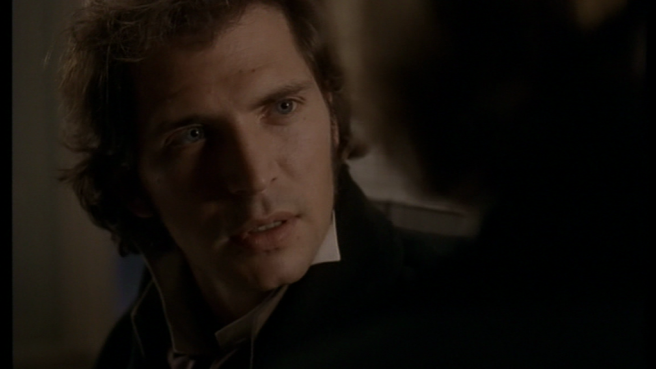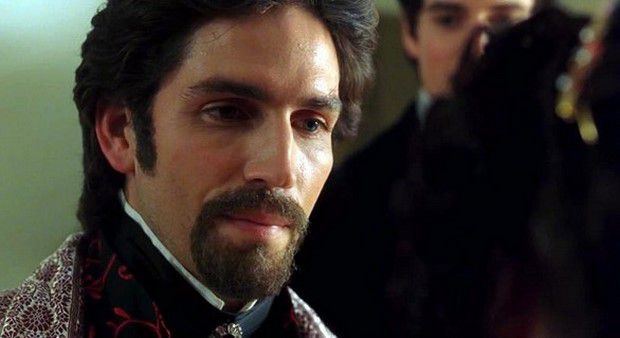
I praised re-reading in a previous post, and my third read of The Count of Montecristo has been, in that sense, a success. Spending several days with one of the members of my personal Capitol Triad of male characters in literature (Edmond Dantés, Mr. Darcy and Prince Bolkonsky) is, as the famous ad says “priceless”. Moreover, each time I re-read one of these master pieces of literature I make a new discovery. This time it has a name and surname: Maximilian Morrel.
I remembered Maximilian only as the dull-spineless-lover of the cheesy Valentine Villefort; I have to say on my defense that I have not been the only one and that I was in the good company of tv writers, film directors and even scholars. For instance Keith Wren in the introduction of the Wordsworth Classics edition writes “about the star cross’d lovers, Maximilian and Valentine, the least said the better”.

But Maximilian Morrel is more than that… Of course, after a first reading, when you’re able to see beyond the shadow of his overwhelming father-figure Edmond Dantés. Nevertheless, re-reading the novel, I have realized that in other circumstances (f.i. if created by another writer) this character would deserve an epic of his own. Dumas, anyway, has always been honest with us regarding Maximilian: he’s a first prize; if we don’t see it, is all our fault. The first time he is mentioned, he is described “a strong-minded, upright young man”.
In his regiment Maximilian Morrel was noted for his rigid observance, not only of the obligations imposed on a soldier, but also on the duties of a man; and he thus gained the name of ‘the stoic’. We need hardly say that many of those who gave him this epithet repeated it because they had heard it, and did not even know what it meant.
After this introduction we see Maximilian willing to share with his father the weight of the shame that the eventual failure of the family merchant company will bring upon them, declaring himself ready also to commit suicide with the second pistol that his father concealed in his drawer for that occasion. The family is saved by Sinbad the Sailor/Lord Wilmore (one of the many alias of Edmond Dantés), and ten years later we meet again Maximilian in Paris, guest of the breakfast offered by Albert Morcef. His entrance can undoubtedly be defined as triumphant.
And he (Château-Renaud) stepped on one side to give place to a young man of refined and dignified bearing, with large and open brow, piercing eyes, and black moustache […] A rich uniform, half-French, half-Oriental, set off his graceful and stalwart figure, and his broad chest was decorated with the order of the Legion of Honour
Maximilian is introduced in the circle of Parisian high-society young men as he has saved in Africa one of his members, M. de Château-Renaud: “I already felt the cold steel on my neck” (he says) “when this gentleman whom you see here charged them, shot the one who held me by the hair, and cleft the skull of the other with his sabre”. And why did he save him? The main reason because “it was the 5th of September, the anniversary of the day in which my father was miraculously preserved; therefore, as far as it lays in my power, I endeavour to celebrate it by some…” heroic-action, as Château-Renaud puts it.

Morrel is a war-hero, a Poe-like romantic figure in the cemetery or Père-La-Chaise during the burial of his beloved Valentine “with his coat buttoned up to his throat, his face livid, and convulsively crushing his hat between his fingers, leaned against a tree, situated in an elevation commanding the mauseoleum, so that none of the funeral details could escape his observation”. He is a strong-willed man, with a deep sense of honour. In a sense, Maximilian is what Dantés would have been without a Danglars, Fernand or Villefort. When he learns that Valentine has been poisoned, he, as Dantés, considers himself the hand of providence.
You M. de Villefort, send for the priest, I will be the avenger
All the above framed in a beautiful, elegant but also strong body (Morrel was seen carrying, with superhuman strength, the armchair containing Noirtier upstairs) and a bright mind. He (but also Villefort, at the very end), is the only character in the whole novel to face Montecristo.
You, who pretend to understand everything, even the hidden sources of knowledge – and who enact the part of a guardian angel upon earth, and could not even find an antidote to a poison administered to a young girl! Ah, sir, indeed you would inspire me with pity, were you not hateful in my eyes
Therefore, considering all the above, why, when referring to Maximilian Morrel “the least said the better”? Why to reduce him in the several adaptations of the novel to screen or radio-drama, to a pathetic crybaby or an improbable Romeo? Maybe because Morrel is too perfect, too good to be true to make him real and we react rejecting him. A perfect human reaction, that’s what I feel towards the Jamie adored by legions of women in “Outlander” (I’m completely unable to connect with someone so utterly perfect). Whereas Dantés-Montecristo has some defects (the first of them all the tendency of considering himself God and believe it) that render him, nevertheless, human, the only thing we can blame Maximilian is living, when he’s not serving in the army, with the “royals of cheesiness”, his sister and brother-in-law.

Anyway, as far as screen adaptations of “The Count of Montecristo” are concerned, the neglect of Maximilian Morrel’s character is “peccata minuta” compared to the fake happy-ending Dantés-Mércèdes. That would deserve another post.






![WP_20160326_17_02_39_Pro[1]](https://wormwoodscrubs.files.wordpress.com/2016/04/wp_20160326_17_02_39_pro1.jpg?w=656)
![WP_20160325_20_02_28_Pro[1]](https://wormwoodscrubs.files.wordpress.com/2016/04/wp_20160325_20_02_28_pro1.jpg?w=656)
![WP_20160326_11_47_48_Pro[1]](https://wormwoodscrubs.files.wordpress.com/2016/04/wp_20160326_11_47_48_pro1.jpg?w=656&h=368)
![WP_20160326_18_46_31_Pro[1]](https://wormwoodscrubs.files.wordpress.com/2016/04/wp_20160326_18_46_31_pro1.jpg?w=656&h=368)
![InstagramCapture_131d014d-3eee-460d-9a1a-c7e2623f6dd5[1]](https://wormwoodscrubs.files.wordpress.com/2016/04/instagramcapture_131d014d-3eee-460d-9a1a-c7e2623f6dd51-e1459772227590.jpg?w=656&h=356)